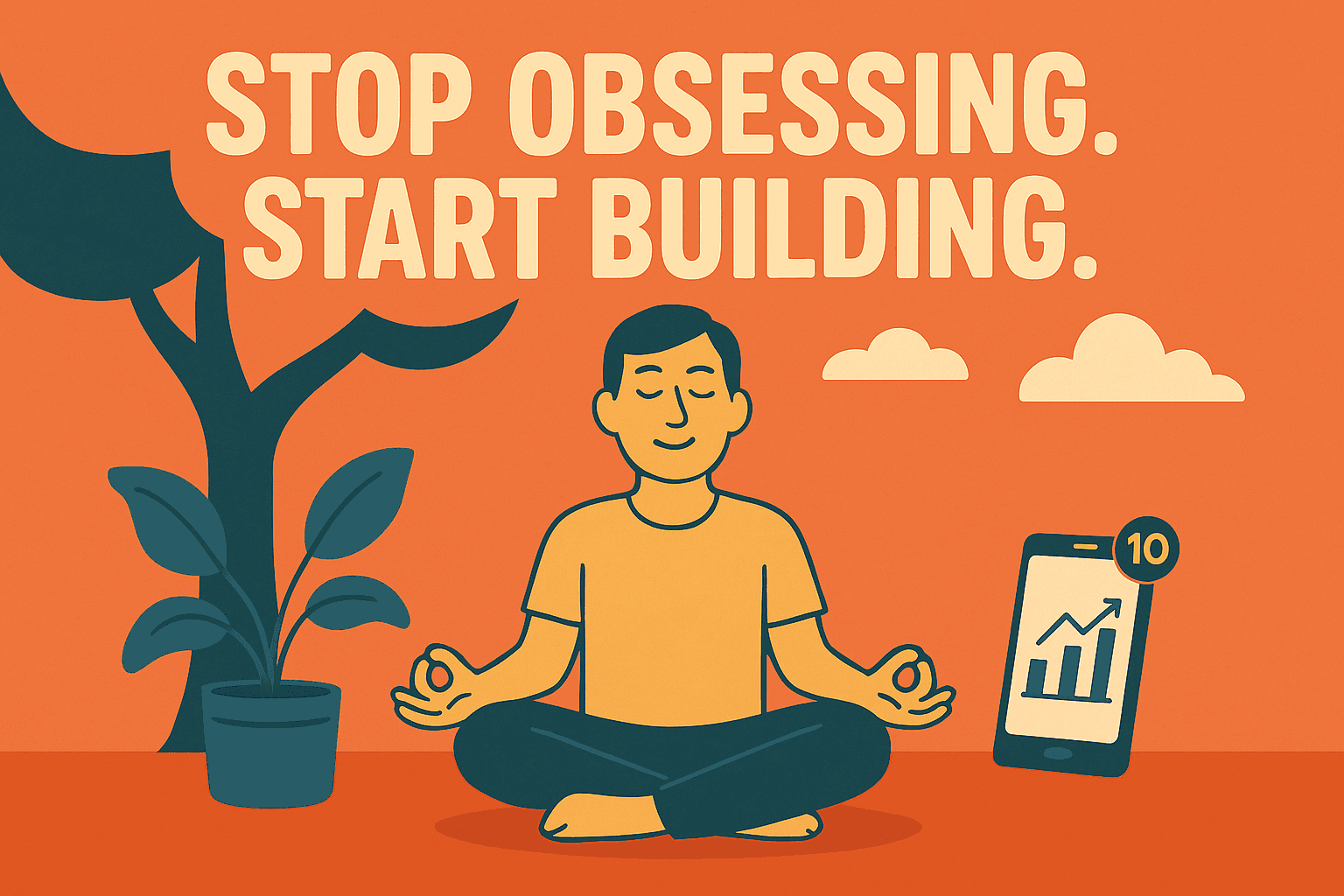Real talk from a technical founder building AI-powered businesses
Published September 15, 2025 • Based on Founder Reality Episode 17
Also available on: Apple Podcasts • Spotify • YouTube
A few years ago, I used to check my Y Combinator application multiple times a day. When we applied in 2021, I'm pretty sure I refreshed that page more than 20 times daily.
Just recently, I was obsessively checking Twitter analytics - how many new followers did I get? How many likes on that tweet? Only five likes? Must be bad content. Thirty likes? Now we're getting somewhere!
With SimpleDirect, I was checking Stripe revenue, Google Analytics, Amplitude - every dashboard I could find, every single day. As if today's numbers would reveal some magical insight I missed yesterday.
Then something weird happened. A few weeks ago, I just stopped caring about the numbers completely. And everything actually started working better.
The Y Combinator Obsession
Let me take you back to 2021. We applied to YC twice - once in 2021, once in 2022. Both times we got interviews, but unfortunately didn't make it through.
I remember finishing our second interview around 1 PM. Then I became completely obsessed with the results. I knew they'd call if it was a yes, email if it was a no. I was refreshing the YC applicant forum constantly, checking what everyone else was saying about their interviews, stressing out my co-founders with my manic energy.
Back then, YC had just bumped their investment to $250K. For a bunch of students with no jobs, that felt like four to five years of runway - life-changing money.
Just thinking about that time gives me anxiety. I was treating the application status like a video game score instead of focusing on building a great product that customers actually wanted.
The Twitter Trap
The same pattern repeated with Twitter over the past few months. I'd post something, then obsessively refresh to see the engagement. Five likes meant failure. Thirty likes meant success. I was treating metrics like trophies instead of focusing on creating genuine value.
My setup was deliberately complicated - no Twitter app on my phone, only Safari browser extensions. But I'd find workarounds, downloading the app "just to check quickly" as if that would make me less obsessed.
The truth is, all this checking was just personal anxiety disguised as work. I thought I was being "data-driven," but I was actually just being insecure and unconfident about what I was building.

The Real Cost of Metric Obsession
Here's what I realized: confident founders who know what they're doing check their metrics maybe once a week, or once a month. Only insecure people like me need to check constantly.
Every time I checked my phone, I'd lose 10-20 minutes of attention span. Multiply that by dozens of checks per day, and you're looking at 2-3 hours of lost productivity. Time I could have spent brainstorming business strategy, writing code, or learning new frameworks.
With SimpleDirect, I was chasing vanity metrics - user signups, page views, blog post engagement. But when our major partnership pulled out, all those numbers became meaningless. I realized I wasn't focusing on the end-to-end customer experience or sustainable distribution. One partner leaving could collapse the whole tower.
The Paradox of Not Caring
When I stopped obsessing over metrics, something counterintuitive happened. The numbers actually got better.
Looking back, my most successful period on Twitter was about a year ago when I was posting consistently once a day without checking results. I wasn't "successful" because I had some special strategy - I was successful because I was consistent and didn't care about daily fluctuations.
The same principle applied to SimpleDirect. When I wasn't constantly checking dashboards, I was actually talking to customers and building features they wanted instead of optimizing for vanity metrics.
The Math of Consistency vs. Intensity
Most founders want the big breakthrough - the viral moment, the hockey stick growth, the overnight success story. We chase moonshots and ignore daily improvements.
But here's the math everyone knows but forgets: if you improve something by just 1% every single day for a year, you're 37 times better at the end. Not 365% better - 3,700% better. That's the power of compounding.
Want the full playbook? I wrote a free 350+ page book on building without VC.
Read the free book·Online, free
Instead of chasing those dramatic moments, I now ask myself one question every morning: What is the one thing I can make better today?
I don't check, measure, or analyze obsessively. I just try to improve - make myself more productive, make the business genuinely 1% better. That's actually harder to achieve than it sounds, and many days you won't feel like you made any progress. But compounding works even when you can't see it.
The Weekly Review System
Now I check my metrics once a week during my Sunday review. I drink my coffee, lock in for an hour, and look at the data with fresh eyes. No daily anxiety, no constant refreshing.
The irony is that when you stop checking obsessively and focus on fundamentals, things actually start working. Consistency beats intensity. Building beats measuring. Sometimes the best thing you can do for your numbers is stop looking at them.
Lessons from the Basecamp Founders
I was listening to the Rework podcast recently, and the Basecamp founders shared a similar story. Even with hundreds of thousands of Twitter followers, when they started a new blog, they saw almost no traffic for the first 30 posts.
The creator of Ruby on Rails - someone with massive influence - was getting crickets on his blog initially. But he didn't give up. He kept writing consistently without obsessing over metrics.
Now they get 800,000 monthly views on one site and 3 million on another. The traffic came, but only after consistent effort without metric obsession.

The One-Month Challenge
If you're currently obsessed with metrics - whether it's social media engagement, website analytics, or revenue dashboards - try this with me for one month:
Ask the daily question instead of checking the daily dashboard.
"How can I make my business 1% better today?" instead of "How many users signed up today?"
Focus on:
- One genuine improvement to your product
- One meaningful conversation with a customer
- One piece of content that provides real value
- One process that makes you more efficient
Why This Actually Works
When you're focused on making something better every single day, you don't have time to obsess over whether it's working. You're too busy actually working on it.
The daily 1% improvements compound in ways that are invisible day-to-day but dramatic year-over-year. Most of the time you won't notice the difference, but that's exactly how compounding works - you only see it when it breaks through the surface.
The Bottom Line
Personal anxiety disguised as work won't make your business successful. Data-driven decisions are important, but obsessive metric checking is just insecurity in disguise.
The founders who win aren't the ones checking their dashboards 20 times a day. They're the ones building something meaningful, talking to customers, and improving consistently without needing constant validation from the numbers.
Sometimes the best thing you can do for your metrics is ignore them completely and focus on the work that actually moves the needle.
Stop checking. Start building. The numbers will follow.
What metrics are you obsessively checking? Let me know on Twitter @TheGeorgePu or email me at george@founderreality.com.

